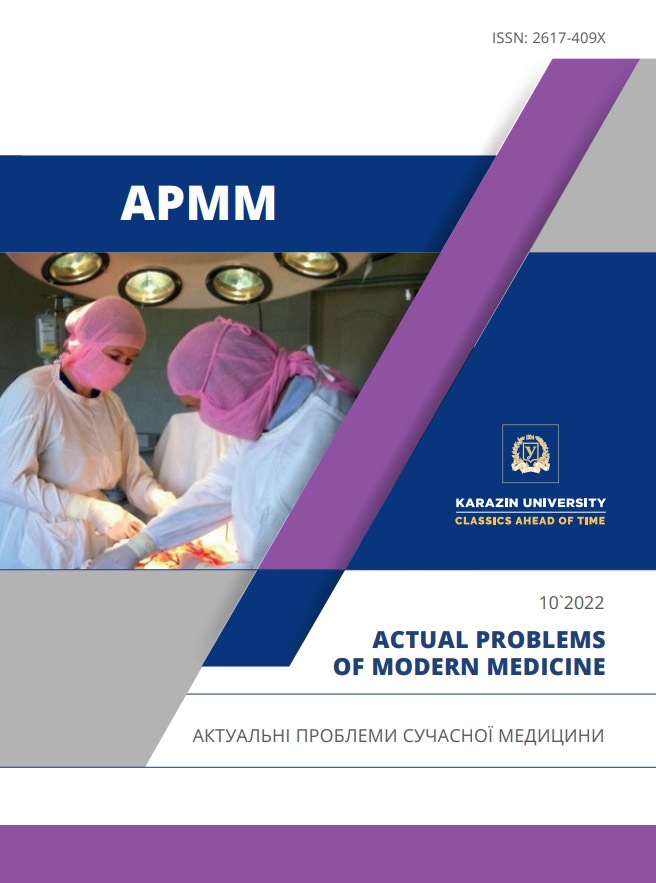Прогностичне значення глобального поздовжнього стрейну лівого шлуночка у хворих на гіпертрофічну кардіоміопатію
Анотація
АНОТАЦІЯ. Гіпертрофічна кардіоміопатія – це одне із розповсюджених генетично обумовлених захворювань міокарда, яке супроводжується розвитком діастолічної, а згодом і систолічної дисфункції міокарда. Метою нашого дослідження стало вивчити клініко-інструментальні особливості хворих на гіпертрофічну кардіоміопатію із порушеними показниками глобального поздовжнього стрейну лівого шлуночка та оцінити його прогностичне значення на розвиток серцево-судинних подій в українській популяції хворих на гіпертрофічну кардіоміопатію. Матеріали та методи. Було ретроспективно проаналізовано дані 35 хворих на гіпертрофічну кардіоміопатію, яким проведене комплексне клініко-інструментальне обстеження з визначенням абсолютного показника GLS на спекл-трекінг-ехокардіографії. Хворі були поділені на дві групи: І група (показник глобального стрейну < 14,5) та ІІ група (показник глобального стрейну ≥ 14,5). Результати. Зниження GLS асоціювалося із більшою тривалістю захворювання (8 (5-11) і 3 (2-5) років, р=0,003), збільшенням кількості скарг на перебої в роботі серця (66,7% і 23,5%, р=0,018) та слабкість (61,1% і 23,5%, р=0,04), підвищенням систолічного артеріального тиску (130 (120-140) проти 110 (100-120) мм рт ст, р=0,009), відсутністю хворих без ознак СН (0 і 29,4%, р=0,019), збільшенням IVRT (106,19±28,62 і 84,57±27,54 мс, р=0,044) та більшою кількістю шлуночкових екстрасистол (17 (4-69) і 2 (0,5-3), з=0,014). За даними аналізу виживання Каплана-Мейера відносно фатальних та нефатальних серцево-судинних подій або комбінації їх з госпіталізацією з приводу СН у них було виявлено достовірно гірші показники виживання (Log-Rank, р=0,016 та р=0,003). Висновки Хворі на гіпертрофічну кардіоміопатію з поганими показниками GLS характеризувалися гіршими клініко-інструментальними даними та несприятливим серцево-судинним прогнозом.
Завантаження
Посилання
Authors/Task Force members; Elliott PM, Anastasakis A, Borger MA, Borggrefe M, Cecchi F, Charron P, et al. 2014 ESC Guidelines on diagnosis and management of hypertrophic cardiomyopathy: the Task Force for the Diagnosis and Management of Hypertrophic Cardiomyopathy of the European Society of Cardiology (ESC). Eur Heart J. 2014 Oct 14;35(39):2733-79. DOI: https://doi.org/10.1093/eurheartj/ehu284
Maron BJ, Gardin JM, Flack JM, Gidding SS, Kurosaki TT, Bild DE. Prevalence of hypertrophic cardiomyopathy in a general population of young adults. Echocardiographic analysis of 4111 subjects in the CARDIA Study. Coronary Artery Risk Development in (Young) Adults. Circulation. 1995 Aug 15;92(4):785-9. DOI: https://doi.org/10.1161/01.cir.92.4.785
Varma PK, Neema PK. Hypertrophic cardiomyopathy: part 1 - introduction, pathology and pathophysiology. Ann Card Anaesth. 2014 Apr-Jun;17(2):118-24. DOI: https://doi.org/10.4103/0971-9784.129841
Ommen SR, Mital S, Burke MA, Day SM, Deswal A, Elliott P, et al. 2020 AHA/ACC Guideline for the Diagnosis and Treatment of Patients With Hypertrophic Cardiomyopathy: A Report of the American College of Cardiology/American Heart Association Joint Committee on Clinical Practice Guidelines. Circulation. 2020 Dec 22;142(25):e558-e631. DOI: https://doi.org/10.1161/CIR.0000000000000937
Maron BJ. Clinical Course and Management of Hypertrophic Cardiomyopathy. N Engl J Med. 2018 Aug 16;379(7):655-668. DOI: https://doi.org/10.1056/NEJMra1710575
Nesukai EH, Adarychev VV, Tytov EIu, Hyresh YY. Apykalnaia hypertrofycheskaia kardyomyopatyia. Klynycheskyi sluchai y obzor lyteraturы. Artery-alnaia hypertenzyia; 2017;1.51:60-71. DOI: https://doi.org/10.22141/2224-1485.1.51.2017.96251 [in Ukrainian]
Tseluiko VY, Kynoshenko KIu, Myshchuk NE. Otsenka deformatsyy myokarda levoho zheludochka v klyny-cheskoi praktyke. Liky Ukrainy 2014; 9(185): 52-56. [in Ukrainian]
Trembovetskaia EM, Knыshov HV, Zakharova VP. Pro-dolnoe sehmentarnoe smeshchenye stenok levoho zhe-ludochka u bolnыkh hypertrofycheskoi kar-dyomyopatyei. Ukraynskyi kardyolohycheskyi zhur-nal, 2015, 1: 81-85. Dostupno na :http://journal.ukrcardio.org/wp-content/uploads/2015/01/9_1_2015.pdf
Tseluyko VYo, Butko OO, Konstantin YuK. Prognostic Value of Different Electrocardiographic Patterns in Hypertrophic Cardiomyopathy Patients. EC Cardiology 2022;9.7:04-17. Available from: https://ecronicon.org/assets/eccy/pdf/ECCY-09-00897.pdf
de la Rosa A, Shah M, Shiota T, Siegel R, Rader F. Comparing echocardiographic characteristics in genotype positive-phenotype positive hypertrophic cardiomyopathy and hypertensive left ventricular hypertrophy. Eur Heart J Cardiovasc Imaging. 2022 Feb 22;23(3):340-348. DOI: https://doi.org/10.1093/ehjci/jeab217. PMID: 34694376
Baudry G, Mansencal N, Reynaud A, Richard P, Dubourg O, Komajda M, et al. Global and regional echocardiographic strain to assess the early phase of hypertrophic cardiomyopathy due to sarcomeric mutations. Eur Heart J Cardiovasc Imaging. 2020 Mar 1;21(3):291-298. DOI: https://doi.org/10.1093/ehjci/jez084. PMID: 31056691
Van Velzen HG, Schinkel AFL, van Grootel RWJ, van Slegtenhorst MA, van der Velden J, Strachinaru M, et al. Five-year prognostic significance of global longitudinal strain in individuals with a hypertrophic cardiomyopathy gene mutation without hypertrophic changes. Neth Heart J. 2019;27(3):117-126. DOI: https://doi.org/10.1007/s12471-019-1226-5
Tower-Rader A, Mohananey D, To A, Lever HM, Popovic ZB, Desai MY. Prognostic Value of Global Longitudinal Strain in Hypertrophic Cardiomyopathy: A Systematic Review of Existing Literature. JACC Cardiovasc Imaging. 2019;12(10):1930-1942. DOI: https://doi.org/10.1016/j.jcmg.2018.07.016
Yang Y, Wu D, Wang H, Wang Y. Prognostic value of global longitudinal strain in hypertrophic cardiomyopathy: A systematic review and meta-analysis. Clin Cardiol. 2022;45(12):1184-1191. DOI: https://doi.org/10.1002/clc.23928
Reant P, Mirabel M, Lloyd G, Peyrou J, Lopez Ayala JM, Dickie S, et al. Global longitudinal strain is associated with heart failure outcomes in hypertrophic cardiomyopathy. Heart. 2016 May 15;102(10):741-7. DOI: https://doi.org/10.1136/heartjnl-2015-308576
Lee HJ, Kim HK, Lee SC, Kim J, Park JB, Hwang IC, et al. Supplementary role of left ventricular global longitudinal strain for predicting sudden cardiac death in hypertrophic cardiomyopathy. Eur Heart J Cardiovasc Imaging. 2022;23(8):1108-1116. DOI: https://doi.org/10.1093/ehjci/jeab187
Haland TF, Almaas VM, Hasselberg NE, Saberniak J, Leren IS, Hopp E, et al. Strain echocardiography is related to fibrosis and ventricular arrhythmias in hypertrophic cardiomyopathy. Eur Heart J Cardiovasc Imaging. 2016;17(6):613-21. DOI: https://doi.org/10.1093/ehjci/jew005
Gil TCP, Castier MB, Gondar AFP, Sales AF, Santos MO, Lima FCDS, et al. Strain Analysis of Left Ventricular Function in the Association of Hypertrophic Cardiomyopathy and Systemic Arterial Hypertension. Arq Bras Cardiol. 2019 Sep 2;113(4):677-684. DOI: https://doi.org/10.5935/abc.20190176




